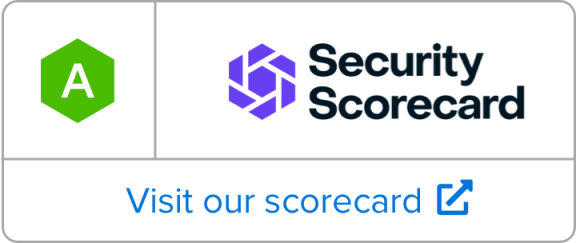
Cybersecurity risks are more of a concern than ever. The Allianz Risk Barometer found that cyber incidents are the most important global risk of 2022, with 44% of risk management experts putting it at the top of their list. All the while, more organizations are adding technology to their portfolio.
With organizations doing everything they can to combat disruption, the marketplace is continuing to grow for specialized software services. With these third parties having access to more of companies’ data, the need for strong cybersecurity programs is paramount. Verizon’s Data Breach Investigations Report shows that “partners” are a factor in 39% of data breaches last year. So for organizations bringing on new technology, they need to trust their technology partners with their information. That is why Quickbase takes cybersecurity so seriously – and why we are so excited about our top ranking with SecurityScorecard.
Out of the nearly 12 million organizations they rank, SecurityScorecard rated Quickbase's cybersecurity program #1 on their "Top 10" index this past month. This is the result of our long-standing commitment to cybersecurity – and a remarkable achievement!
SecurityScorecard's recognition is the latest example of our deep-rooted security culture at Quickbase. Topping such an industry-leading list would be impossible without a dedication to cross-organizational collaboration in a very cooperative and positive way, one of the most extraordinary things I've observed since joining Quickbase in December of 2021.
This feat is all the more impressive because many organizations find it challenging to manage the metrics tracked and prioritized by companies like SecurityScorecard. The rapid pace of change in the technology industry and significant advancements in security research make it burdensome to address publicly available information effectively. In frustration, many organizations chalk it up as an unreasonable standard, especially for companies such as ours that deliver a product over the public Internet.
However, industry research
reinforces the need for such metrics. Companies averaging an 'A' rating from
SecurityScorecard, as Quickbase has maintained for years, are more resilient
against cyber-attack and up to 7.7 times less likely to suffer a breach than
those scoring a 'B' (the overall average of the technology industry) or lower.
While there are many facets to a healthy cybersecurity program, such as identity management, strong access control points, and threat hunting, these external Internet-facing signals are critical to manage purposefully as they directly correlate to exploitability. There is absolute value in asking, "why do we look like this to the world?"
Here at Quickbase, our leadership began asking that question years ago, and it shows up in the daily work of our product, quality, reliability, security, and technology engineering teams in an exceptional and unique way, just as SecurityScorecard has observed.
As a market leader in the no-code space for over 20 years, we empower citizen development at thousands of organizations to reimagine how information is delivered and managed every day. The technology we provide carries with it a profound responsibility to protect our customer's data throughout its lifecycle, and that's only possible because every individual at Quickbase makes their personal commitment to embracing a culture of security.
As CISO, that's been heartening to witness and makes my role considerably more enjoyable. With Quickbase’s continued commitment to cybersecutity and the care of our customers’ data, we are thrilled to see this honor ensure that we are on the right track.
Who is SecurityScorecard?
SecurityScorecard, the largest firm in the cybersecurity risk rating industry, uses thousands of Internet-facing signals to rank the cyber-health of companies based on their velocity of correcting security issues and overall response to industry risks. SecurityScorecard then assembles this telemetry into a broadly consumable score (0-100) and associated letter grade (A, B, C, D, and F) to help organizations manage their risk and partner risk.




